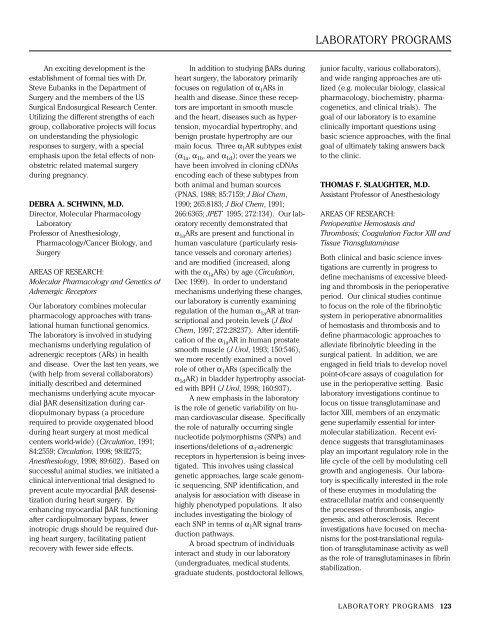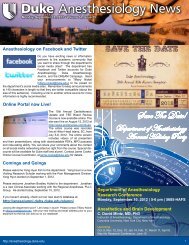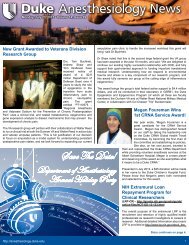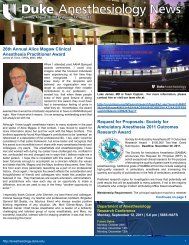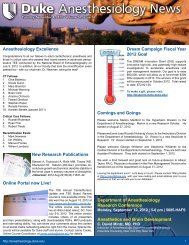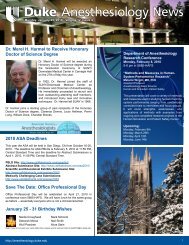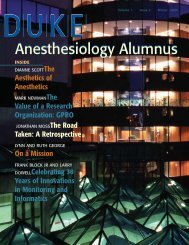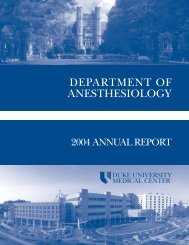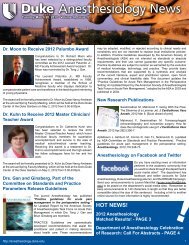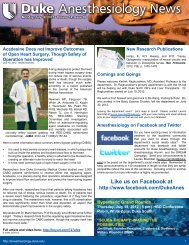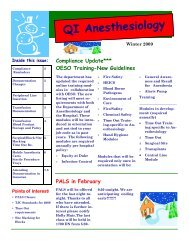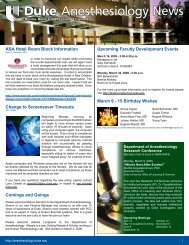DEPARTMENT OF ANESTHESIOLOGY ANNUAL REPORT
DEPARTMENT OF ANESTHESIOLOGY ANNUAL REPORT
DEPARTMENT OF ANESTHESIOLOGY ANNUAL REPORT
Create successful ePaper yourself
Turn your PDF publications into a flip-book with our unique Google optimized e-Paper software.
An exciting development is the<br />
establishment of formal ties with Dr.<br />
Steve Eubanks in the Department of<br />
Surgery and the members of the US<br />
Surgical Endosurgical Research Center.<br />
Utilizing the different strengths of each<br />
group, collaborative projects will focus<br />
on understanding the physiologic<br />
responses to surgery, with a special<br />
emphasis upon the fetal effects of nonobstetric<br />
related maternal surgery<br />
during pregnancy.<br />
DEBRA A. SCHWINN, M.D.<br />
Director, Molecular Pharmacology<br />
Laboratory<br />
Professor of Anesthesiology,<br />
Pharmacology/Cancer Biology, and<br />
Surgery<br />
AREAS <strong>OF</strong> RESEARCH:<br />
Molecular Pharmacology and Genetics of<br />
Adrenergic Receptors<br />
Our laboratory combines molecular<br />
pharmacology approaches with translational<br />
human functional genomics.<br />
The laboratory is involved in studying<br />
mechanisms underlying regulation of<br />
adrenergic receptors (ARs) in health<br />
and disease. Over the last ten years, we<br />
(with help from several collaborators)<br />
initially described and determined<br />
mechanisms underlying acute myocardial<br />
βAR desensitization during cardiopulmonary<br />
bypass (a procedure<br />
required to provide oxygenated blood<br />
during heart surgery at most medical<br />
centers world-wide) (Circulation, 1991;<br />
84:2559; Circulation, 1998; 98:II275;<br />
Anesthesiology, 1998; 89:602). Based on<br />
successful animal studies, we initiated a<br />
clinical interventional trial designed to<br />
prevent acute myocardial βAR desensitization<br />
during heart surgery. By<br />
enhancing myocardial βAR functioning<br />
after cardiopulmonary bypass, fewer<br />
inotropic drugs should be required during<br />
heart surgery, facilitating patient<br />
recovery with fewer side effects.<br />
In addition to studying βARs during<br />
heart surgery, the laboratory primarily<br />
focuses on regulation of α 1ARs in<br />
health and disease. Since these receptors<br />
are important in smooth muscle<br />
and the heart, diseases such as hypertension,<br />
myocardial hypertrophy, and<br />
benign prostate hypertrophy are our<br />
main focus. Three α 1AR subtypes exist<br />
(α 1a, α 1b, and α 1d); over the years we<br />
have been involved in cloning cDNAs<br />
encoding each of these subtypes from<br />
both animal and human sources<br />
(PNAS, 1988; 85:7159; J Biol Chem,<br />
1990; 265:8183; J Biol Chem, 1991;<br />
266:6365; JPET 1995; 272:134). Our laboratory<br />
recently demonstrated that<br />
α 1aARs are present and functional in<br />
human vasculature (particularly resistance<br />
vessels and coronary arteries)<br />
and are modified (increased, along<br />
with the α 1aARs) by age (Circulation,<br />
Dec 1999). In order to understand<br />
mechanisms underlying these changes,<br />
our laboratory is currently examining<br />
regulation of the human α 1aAR at transcriptional<br />
and protein levels (J Biol<br />
Chem, 1997; 272:28237). After identification<br />
of the α 1aAR in human prostate<br />
smooth muscle (J Urol, 1993; 150:546),<br />
we more recently examined a novel<br />
role of other α 1ARs (specifically the<br />
α 1dAR) in bladder hypertrophy associated<br />
with BPH (J Urol, 1998; 160:937).<br />
A new emphasis in the laboratory<br />
is the role of genetic variability on human<br />
cardiovascular disease. Specifically<br />
the role of naturally occurring single<br />
nucleotide polymorphisms (SNPs) and<br />
insertions/deletions of α 1-adrenergic<br />
receptors in hypertension is being investigated.<br />
This involves using classical<br />
genetic approaches, large scale genomic<br />
sequencing, SNP identification, and<br />
analysis for association with disease in<br />
highly phenotyped populations. It also<br />
includes investigating the biology of<br />
each SNP in terms of α 1AR signal transduction<br />
pathways.<br />
A broad spectrum of individuals<br />
interact and study in our laboratory<br />
(undergraduates, medical students,<br />
graduate students, postdoctoral fellows,<br />
LABORATORY PROGRAMS<br />
junior faculty, various collaborators),<br />
and wide ranging approaches are utilized<br />
(e.g. molecular biology, classical<br />
pharmacology, biochemistry, pharmacogenetics,<br />
and clinical trials). The<br />
goal of our laboratory is to examine<br />
clinically important questions using<br />
basic science approaches, with the final<br />
goal of ultimately taking answers back<br />
to the clinic.<br />
THOMAS F. SLAUGHTER, M.D.<br />
Assistant Professor of Anesthesiology<br />
AREAS <strong>OF</strong> RESEARCH:<br />
Perioperative Hemostasis and<br />
Thrombosis; Coagulation Factor XIII and<br />
Tissue Transglutaminase<br />
Both clinical and basic science investigations<br />
are currently in progress to<br />
define mechanisms of excessive bleeding<br />
and thrombosis in the perioperative<br />
period. Our clinical studies continue<br />
to focus on the role of the fibrinolytic<br />
system in perioperative abnormalities<br />
of hemostasis and thrombosis and to<br />
define pharmacologic approaches to<br />
alleviate fibrinolytic bleeding in the<br />
surgical patient. In addition, we are<br />
engaged in field trials to develop novel<br />
point-of-care assays of coagulation for<br />
use in the perioperative setting. Basic<br />
laboratory investigations continue to<br />
focus on tissue transglutaminase and<br />
factor XIII, members of an enzymatic<br />
gene superfamily essential for intermolecular<br />
stabilization. Recent evidence<br />
suggests that transglutaminases<br />
play an important regulatory role in the<br />
life cycle of the cell by modulating cell<br />
growth and angiogenesis. Our laboratory<br />
is specifically interested in the role<br />
of these enzymes in modulating the<br />
extracellular matrix and consequently<br />
the processes of thrombosis, angiogenesis,<br />
and atherosclerosis. Recent<br />
investigations have focused on mechanisms<br />
for the post-translational regulation<br />
of transglutaminase activity as well<br />
as the role of transglutaminases in fibrin<br />
stabilization.<br />
LABORATORY PROGRAMS 123


